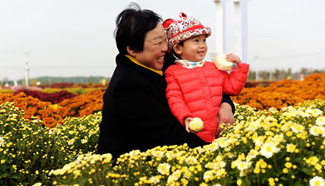BEIJING, Nov. 5 (Xinhua) -- He left as a boy, but after two years in the army Zhao Songqing returned to college as a man.
Zhao, 23, an undergraduate, has now returned to Beijing-based Beihang University to complete his studies, one of 150,000 college army recruits in 2014.
In an attempt to add vigor and diversity to the military, China's armed forces have conscripted undergraduates since 2001, and an increasing number of highly educated students are joining up.
The army lets them express their patriotism in the most direct way possible: by putting down pens and picking up guns.
"It's a great honor for a soldier to make contributions to the nation and its people," Zhao said.
The most difficult but memorable period of Zhao's service was fighting severe floods with his fellow soldiers as China experienced a pattern of freak weather this summer.
It was July 6, just before he finished his service, when Zhao's company was put on "first-degree combat alert." They needed to stand ready to hit flood-ravaged areas -- floods that went on to kill hundreds across China.
They received the order in the afternoon. Hours later, more than 20 soldiers and a lot of supplies crammed into the back of the truck to begin a grueling 30-hour journey.
"It was too hot to sleep, and I could only focus on two things," he said. "I must keep myself safe for my parents' sake, and more importantly, I had to do my best for those flood victims."
Zhao went into the danger zone, not even telling his parents what mission he was on.
Honghu, where Zhao's company was stationed, is a small riverside city in central China's Hubei Province and was one of the areas worst-hit by the flooding.
Every day, the soldiers reinforced the dams with sandbags. Sometimes, they had to jump straight into the river to rebuild the dams.
"The military uniform bestowed us with a sense of honor, so we were willing to work hard and take risks," Zhao said.
Two years ago, just before becoming a senior, Zhao's classmates were busy applying for jobs or graduate school, but he was set to join the army instead.
"I'd always wanted to do something for the nation," he said. "I saw two years in the army as an opportunity to harden myself."
Army authorities are keenly aware of the bravery it takes for young undergraduates to enlist.
"It requires great courage for college students to make the decision," said Qi Jianli from the military office of Beihang University. "College students usually have more opportunities, more choices. They have varied voices around them to give them advice."
Like many enlisted college students, Zhao's parents did not agree with his choice at first. Instead, they hoped that we would follow a "normal" path -- go to grad school, get a good job and make a fortune. But Zhao was insistent, and finally they relented, encouraging him to be the best soldier he could be.
Over two years, Zhao gradually got used to the army's fierce collectivism. He toughened up and turned into a real soldier, inside and out.
After the victory of the Long March of the Red Army in 1930s, more than 100,000 people, mainly educated young people, trudged into war zones to join the army in Yan'an, Shaanxi Province, and other bases of resistance against Japanese aggression. Their arrival promoted literacy in the army and fueled the great victory of the revolution.
The China's Ministry of National Defense recruitment brochure states: "Enlisting more college students can improve the average quality of the army, and inject vigor and vitality into the army's knowledge-base."
In 2001, China's armed forces, for the first time in its history, recruited more than 1,000 undergraduates from universities in a pilot program.
Since 2005, conscription has expanded to cover all colleges and universities. As more and more preferential policies and compensation have been issued for such students, over 100,000 college students have joined the army every year since 2009.
"For the students, joining the army is not just about military skills, but also to toughen themselves up," Qi said. "I remember the first female soldier from Beihang, Wang Yunhong. She looked delicate, but in the army she behaved tough and won many honors."
Zhao recalls that when he was on duty in Shanghai in August last year, a devastating explosion ravaged his hometown, Tianjin, resulting in the deaths of more than 100 rescue workers.
"They came from all over the nation, and died for my hometown. At the exact same time, I was guarding the hometown of other people."










